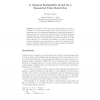Free Online Productivity Tools
i2Speak
i2Symbol
i2OCR
iTex2Img
iWeb2Print
iWeb2Shot
i2Type
iPdf2Split
iPdf2Merge
i2Bopomofo
i2Arabic
i2Style
i2Image
i2PDF
iLatex2Rtf
Sci2ools
187
Voted
ESOP
2016
Springer
2016
Springer
A Classical Realizability Model for a Semantical Value Restriction
We present a new type system with support for proofs of programs in a call-by-value language with control operators. The proof mechanism relies on observational equivalence of (untyped) programs. It appears in two type constructors, which are used for specifying program properties and for encoding dependent products. The main challenge arises from the lack of expressiveness of dependent products due to the value restriction. To circumvent this limitation we relax the syntactic restriction and only require equivalence to a value. The consistency of the system is obtained semantically by constructing a classical realizability model in three layers (values, stacks and terms).
| Added | 03 Apr 2016 |
| Updated | 03 Apr 2016 |
| Type | Journal |
| Year | 2016 |
| Where | ESOP |
| Authors | Rodolphe Lepigre |
Comments (0)

